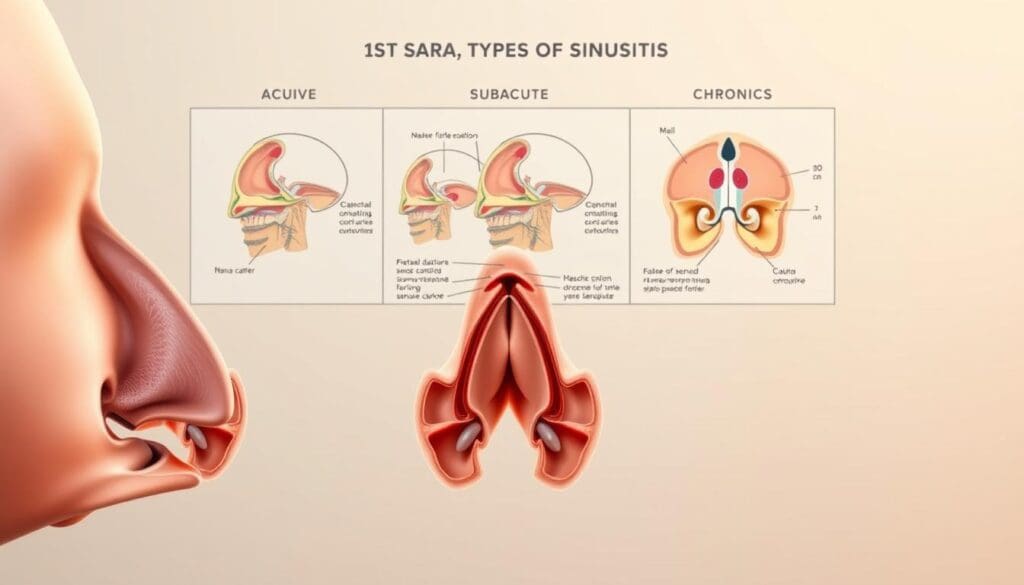Last Updated on October 31, 2025 by Saadet Demir

Sinusitis vs chronic sinusitis: Learn the key difference—acute lasts less than 4 weeks, chronic lasts 12 weeks or more.
Sinusitis, also known as rhinosinusitis, is an inflammation of the mucous membranes lining the paranasal sinuses and nasal passages. It’s a common condition that can be classified into several categories based on duration and characteristics.
At Liv Hospital, we see many patients struggling to distinguish between acute sinusitis and chronic sinusitis. Understanding the differences between these two conditions is key. Acute cases usually get better within weeks, but chronic cases can last for months or years, affecting quality of life.
We offer patient-centered diagnostic and treatment approaches. These are based on the latest medical research and guidelines. Our aim is to provide world-class healthcare with full support for international patients.

First, let’s talk about the sinuses and their role in our health. The sinuses are air-filled spaces around our nasal passages. They help filter the air we breathe.
The sinuses, or paranasal sinuses, have mucous membranes that make mucus. This mucus filters, warms, and humidifies the air. It traps dust, bacteria, and other particles. Even healthy people can have some bacteria in their sinuses.
Sinusitis, or rhinosinusitis, is when the sinuses get inflamed. It can be caused by viruses, bacteria, or fungi. This leads to mucus buildup and can cause infections. It can be either acute, lasting a few weeks, or chronic, lasting more than 12 weeks.
Sinusitis symptoms include nasal congestion, facial pain, headaches, and thick nasal discharge. Some people may also have a reduced sense of smell, cough, or sore throat. The severity and how long these symptoms last can tell if it’s acute or chronic.
Symptom | Acute Sinusitis | Chronic Sinusitis |
Nasal Congestion | Common | Persistent |
Facial Pain/Pressure | Often Present | Variable |
Headache | Frequent | Occasional |
Thick Nasal Discharge | Present | Often Persistent |
Doctors say understanding sinusitis is key to managing it. Getting the right diagnosis is very important. It helps decide the best treatment.
“The sinuses are not just empty spaces; they are critical for our respiratory health, and their dysfunction can lead to significant discomfort and complications.”
— Medical Expert

The length of time you have sinusitis symptoms helps figure out what type you have. Sinusitis is divided into types based on how long symptoms last.
Knowing the type of sinusitis you have is key. It helps doctors understand your condition and choose the right treatment. We divide sinusitis into acute, subacute, chronic, and recurrent acute based on symptom duration.
Acute sinusitis means your sinuses are inflamed for less than four weeks. It’s often caused by viruses like the common cold. Bacterial infections can also cause it. Symptoms include a stuffy nose, facial pain, and thick discharge.
Acute sinusitis is a common problem. It leads to about 30 million doctor visits each year. It also costs a lot in healthcare.
Subacute sinusitis lasts between 4 to 12 weeks. It’s when symptoms go on longer than acute but not as long as chronic. It has similar symptoms to acute but means you’re recovering for a longer time.
Chronic sinusitis lasts over 12 weeks. It can really affect your life, causing a stuffy nose, loss of smell, and facial pressure. Chronic sinusitis needs a detailed treatment plan, including medicine, lifestyle changes, and sometimes surgery.
Recurrent acute sinusitis means you have multiple short episodes of acute sinusitis in a year. Each episode lasts less than four weeks. It’s caused by different infections or factors like allergies or anatomical issues.
The main differences between acute and chronic sinusitis lie in their duration, symptoms, and how they affect daily life. Knowing these differences helps doctors create better treatment plans.
The main difference is how long each lasts. Acute sinusitis lasts less than four weeks. Chronic sinusitis goes on for 12 weeks or more.
Symptoms also differ. Acute sinusitis has severe but short-lived symptoms. These include facial pain, nasal blockage, and thick discharge.
Chronic sinusitis, on the other hand, has long-lasting and milder symptoms. These can be:
The impact on daily life is another big difference. Acute sinusitis is uncomfortable but doesn’t last long. Chronic sinusitis, though, can really affect your life. It can cause ongoing discomfort, sleep problems, and lower productivity.
Managing chronic sinusitis needs a detailed plan. This includes long-term meds, lifestyle changes, and sometimes surgery. By knowing the differences, doctors can give better care.
Many things can lead to acute sinusitis. These include viral infections, bacterial infections, allergic reactions, and issues with the body’s structure. Knowing what causes it helps in treating it effectively.
Viral infections are the top reason for acute sinusitis. The rhinovirus often causes the common cold, which can turn into sinusitis. Other viruses like influenza and adenovirus also play a part.
Sometimes, bacteria cause acute sinusitis. Bacteria can infect the sinuses after a viral cold. Streptococcus pneumoniae and Haemophilus influenzae are common culprits.
Allergic reactions are another big factor. Pollen, dust mites, and pet dander can cause allergic rhinitis. This leads to nasal congestion and sinus inflammation.
Body structure can also lead to sinusitis. A deviated nasal septum, nasal polyps, or other issues can block sinus drainage. This makes it easier for infections to start.
The main risk factors for acute sinusitis are:
Understanding these causes and risk factors helps us prevent and treat acute sinusitis better.
Chronic sinusitis is marked by ongoing inflammation and several risk factors. Knowing these causes is key to managing and treating the condition.
Persistent inflammation is a key feature of chronic sinusitis. This inflammation can start a cycle of irritation and infection. It can be caused by infections, allergies, and environmental irritants.
“The chronic inflammation in chronic sinusitis is more than just an infection,” an expert notes. “It involves complex immune responses and changes in the mucosa.”
Nasal polyps are growths in the nasal passages that can lead to chronic sinusitis. They block drainage and cause ongoing inflammation. Nasal polyps are more common in adults and often happen with asthma.
A deviated septum, where the thin wall between the nasal passages is off-center, raises the risk of chronic sinusitis. This can block drainage and cause increased pressure and inflammation in the sinuses.
Immune system disorders can also contribute to chronic sinusitis. Conditions that weaken the immune system make it hard to fight off infections. People with immune deficiencies or autoimmune disorders are more at risk.
Understanding the causes and risk factors of chronic sinusitis helps healthcare providers create effective treatment plans. These plans may include medical treatments, lifestyle changes, and sometimes surgery.
Diagnosing sinusitis is complex. It involves a physical exam, patient history, and tests. These steps help us figure out the type and how bad it is. This is key for a good treatment plan.
A thorough physical exam is the first step. We look for signs of sinus problems like nasal congestion and facial tenderness. We also use a nasal speculum to check the nasal passages for infection or abnormalities.
Imaging tests like CT scans and MRIs are very important. They give us detailed views of the sinuses. CT scans are great for seeing the sinuses and finding any issues. MRIs help us see soft tissues and find problems like tumors or abscesses.
Nasal endoscopy lets us see inside the nasal passages. We use a flexible or rigid endoscope to check the sinuses. This helps us see the mucosa and find any problems. Nasal endoscopy is very helpful for chronic sinusitis and checking treatment.
Allergy testing might be needed to find out if allergies are causing sinusitis. We use skin prick tests or blood tests to find specific allergens. Knowing about allergies helps us choose the right treatment.
By using these methods, we can accurately diagnose sinusitis. We can then create a treatment plan that fits the patient’s needs.
Acute sinusitis treatment involves home remedies, over-the-counter meds, and doctor advice. Most cases are viral and don’t need antibiotics.
Home remedies are key in managing acute sinusitis symptoms. Staying hydrated thins out mucus, making it easier to expel. A humidifier adds moisture to the air, reducing congestion.
Applying a warm compress to the face can ease pain and loosen mucus. Nasal saline irrigation is also effective. It rinses the nasal passages with a saline solution to clear out mucus and debris.
OTC meds can help a lot with acute sinusitis symptoms. Decongestants reduce nasal congestion, making breathing easier. Pain relievers like acetaminophen or ibuprofen can help with headaches and facial pain.
Always follow the label instructions and talk to a healthcare provider if you have questions about OTC meds.
Most acute sinusitis cases are viral and don’t need antibiotics. But, bacterial sinusitis might require them. Doctors might prescribe antibiotics if symptoms get worse or if they suspect a bacterial infection.
It’s important to use antibiotics wisely to prevent antibiotic resistance. Always finish the full course of antibiotics, even if you start feeling better before finishing them.
Nasal irrigation is great for managing acute sinusitis. It rinses the nasal passages with a saline solution to remove mucus, debris, and allergens. You can use a neti pot, a squeeze bottle, or a nasal irrigator.
To safely do nasal irrigation, use sterile or distilled water. Also, make sure to clean the irrigation device well after each use.
Dealing with chronic sinusitis often means a long-term plan. This might include medication, immunotherapy, and surgery. Each patient’s needs are unique, so a personalized approach is key.
Medication is a big part of treating chronic sinusitis. Antibiotics are used to fight infections, but they’re used carefully to avoid resistance. Saline nasal sprays help keep the nasal passages moist and aid in drainage.
Key Medications:
Corticosteroids are strong anti-inflammatory drugs. They can be given as nasal sprays or pills. They help reduce swelling and inflammation in the nasal passages, making symptoms better.
Nasal corticosteroid sprays are great because they target the problem area directly. This means fewer side effects for the whole body.
For those with allergy-related sinusitis, immunotherapy is a good choice. It involves regular shots or tablets of allergens to make the immune system less reactive.
Treatment Option | Description | Benefits |
Immunotherapy | Desensitization to specific allergens through injections or sublingual tablets | Reduces allergic reactions, potentially decreasing sinusitis symptoms |
Corticosteroid Sprays | Nasal sprays that reduce inflammation | Effective in reducing nasal inflammation and congestion |
Long-term Antibiotics | Antibiotics for managing chronic bacterial infections | Controls bacterial infections that may cause or exacerbate sinusitis |
Surgery might be needed if anatomical issues like a deviated septum or nasal polyps cause sinusitis. Functional endoscopic sinus surgery (FESS) is a common procedure. It aims to improve drainage and lower infection risk.
The right treatment depends on the patient’s specific situation. This includes the severity of symptoms, underlying causes, and overall health. Getting a thorough evaluation from an ENT specialist is essential for finding the best treatment plan.
Not treating sinusitis can lead to serious problems. These can affect the eyes, brain, and other important areas. Both acute and chronic sinusitis can cause big health issues if not managed right. We’ll look at the possible complications and when to get medical help.
Acute sinusitis can cause serious issues if it doesn’t get better. This includes infections around the eye, like orbital cellulitis or abscess. Rarely, the infection can reach the brain, causing meningitis or a brain abscess.
Chronic sinusitis can make life hard with ongoing symptoms. It can lead to nasal polyps, which block breathing. It also causes chronic inflammation that can harm the sinus tissues.
Knowing when to get help for sinusitis is key. Severe headache, eye swelling, confusion, or high fever are warning signs. If you see these, go to the emergency room right away.
To prevent sinusitis, you need a plan that covers your environment, lifestyle, and health issues like allergies and asthma. These steps can greatly lower your chance of getting sinusitis.
Controlling your environment is key to preventing sinusitis. Use air purifiers to clean the air, keep your home clean, and stay away from tobacco smoke.
Also, humidifiers help keep the air in your home just right. This stops your nasal passages from drying out and lowers the chance of irritation.
Changing your lifestyle can also help prevent sinusitis. Quitting smoking is a big step, as smoking increases your risk. Regular exercise and a healthy diet boost your immune system, helping you fight off infections better.
If you have allergies or asthma, managing them well is key to avoiding sinusitis. Use prescribed medications as told, avoid allergens, and watch your asthma symptoms. Immunotherapy might help some people by making them less sensitive to allergens.
Getting the right vaccinations, like the flu vaccine and pneumococcal vaccine, can prevent infections that might lead to sinusitis. Talk to your healthcare provider about the best vaccination schedule for you.
By following these prevention steps, you can lower your risk of sinusitis and enjoy a better life.
Managing sinusitis well means knowing a lot about it. You need to understand its causes, treatments, and how to prevent it. Knowing the difference between acute and chronic sinusitis helps you handle your situation better.
We’ve looked at what causes sinusitis, who’s at risk, and how doctors diagnose it. We’ve also talked about treatments for both acute and chronic sinusitis. With the right treatment and care, you can control your symptoms and live better.
Living with sinusitis means you have to take action. You should control your environment, make lifestyle changes, and handle allergies and asthma. These steps can lower your risk of sinusitis and make it easier to live with.
Managing sinusitis is a team effort between you and your doctor. We urge you to get medical help when you need it. Working with your healthcare team can help you manage your sinusitis and improve your health.
The main difference is how long it lasts. Acute sinusitis is short, lasting less than 4 weeks. Chronic sinusitis goes on for 12 weeks or more.
Symptoms include nasal congestion, facial pain, and headaches. You might also have thick nasal discharge and lose your sense of smell. The severity and how long these symptoms last can vary.
It’s often caused by viruses, like the common cold. But, it can also be caused by bacteria, allergies, or a deviated septum.
Chronic sinusitis needs long-term care. This includes corticosteroids, immunotherapy, and sometimes surgery. Acute sinusitis can be treated with home remedies, over-the-counter meds, and antibiotics when needed.
Risk factors include inflammation, nasal polyps, a deviated septum, and immune system issues. These can make the condition chronic.
Doctors use physical exams, imaging tests like CT scans, nasal endoscopy, and allergy tests. These tools help figure out the type and severity of sinusitis.
Untreated sinusitis can cause serious problems. These include orbital cellulitis, meningitis, and osteomyelitis in acute cases. Chronic cases can lead to long-term issues like persistent nasal congestion and loss of smell.
To prevent sinusitis, control your environment, make lifestyle changes, manage allergies and asthma, and consider vaccinations. These steps can lower your risk.
Antibiotics are key for bacterial sinusitis. But, they don’t work on viruses. Use antibiotics wisely, based on the cause and severity of your condition.
Yes, home remedies like nasal irrigation and steam inhalation can help with acute sinusitis. But, chronic sinusitis often needs more complex treatments.
Sinusitis and rhinosinusitis are often the same thing. But, rhinosinusitis better describes inflammation of both nasal passages and sinuses, which is common in the condition.
Yes, managing chronic sinusitis long-term includes medication, corticosteroids, and lifestyle changes. These help manage symptoms and prevent flare-ups.
National Center for Biotechnology Information. (2025). Whats the Difference Between Acute and Chronic Sinusitis. Retrieved from https://www.ncbi.nlm.nih.gov/books/NBK441934/>
Subscribe to our e-newsletter to stay informed about the latest innovations in the world of health and exclusive offers!
WhatsApp us